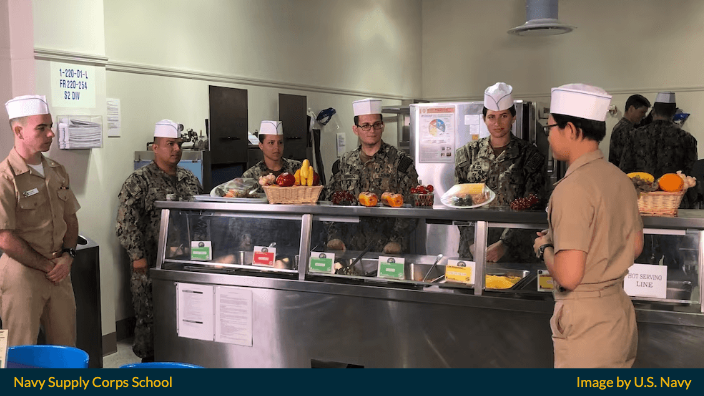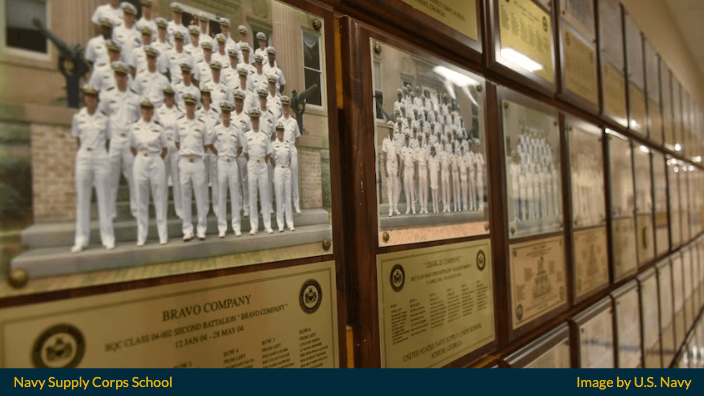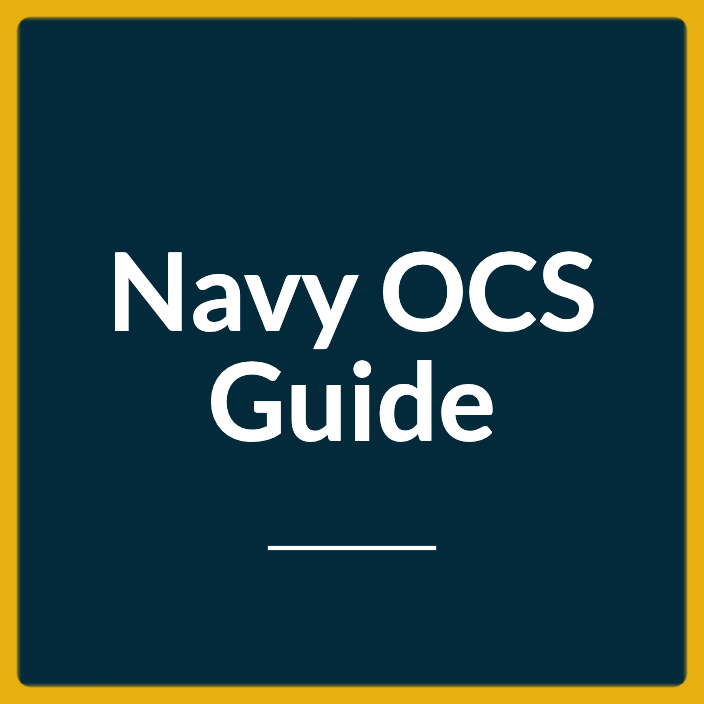The Navy Supply Corps School in Rhode Island trains junior officers in the Supply Corps—both fresh recruits and those needing a refresher. It also runs specialized programs for supply officers throughout their careers.
This place has history. And it covers everything—shore and afloat supply management, retail ops, logistics. New officers walk out ready for entry-level roles in the afloat supply department.
Later, they move up—department head, division officer, limited duty officer.
Training isn’t just about keeping ships stocked. Supply officers learn expeditionary logistics, working in high-stakes operational environments, at home and abroad.
History of the Navy Supply Corps School
Founded in 1955, the Navy Supply Corps School has shaped the backbone of Navy logistics. They call it the “Cradle of the Supply Corps” because every supply officer passes through here—whether for entry-level training or specialized programs for department heads, division officers, and limited duty officers. Career-long development isn’t optional; it’s built into the system.
Originally in Athens, Georgia, the school pumped money into the local economy with jobs and defense spending. But in 2018, it moved to Newport, Rhode Island.
The new setup? Modern classrooms, high-tech learning spaces, and everything needed to train the next wave of supply officers.
The impact? Undeniable. This school has trained generations of officers who keep the Navy’s supply chain running—on land, at sea, and in operational environments worldwide. If you’re in the Navy, you know this place.
Supply Corps Training

The Navy Supply Corps School trains officers for supply assignments, mixing classroom lessons, hands-on exercises, and real-world discussions. It’s not just theory—officers leave ready for operational environments like afloat supply departments and aviation supply material maintenance.
Training covers everything: supply management, retail ops, hazardous material transport, public supplies. They even dive into the history and traditions of the Supply Corps. The program is tough for a reason—officers need to be sharp when they hit the fleet.
Courses span initial and refresher training, expeditionary logistics, and leadership development for junior officers. Limited duty officers get specialized programs. NAVSUP also runs courses here, adding advanced topics in shore and afloat supply management.
Aviation supply material maintenance, joint aviation supply management, Pre-Commissioning Supply Officer (PCSO), public supplies—it’s all part of the curriculum.
Bottom line: this school builds supply officers who keep the Navy mission-ready.
Junior Officers and Entry-Level Positions
Junior officers in the Navy Supply Corps keep the operation running. They handle the logistics that make or break a mission—food, fuel, repair parts. Every ship, every unit depends on them to stay stocked and ready.
New Supply Corps officers step into “back office” roles, managing inventory and supply chains. If something runs out, the mission slows down. Timely resupply isn’t just important—it’s everything.
To prep for leadership, officers take the Division Officer Leadership Course (DOLC) at the Navy Supply Corps School. It’s built for first-time leaders managing 10 to 100 enlisted sailors. The focus? Leadership fundamentals: competition, collaboration, time management, and administration.
Competition and collaboration? That’s teamwork and individual performance. Time management? Prioritization. Functional administration? The nuts and bolts—accounting, procurement, inventory.
Entry-level Supply Corps roles aren’t easy. Officers juggle supply operations in high-pressure environments. But it’s essential work. Strong management skills mean mission success, and junior officers carry that responsibility from day one.
Refresher Training for Experienced Personnel
Experienced Supply Corps officers don’t just rely on what they learned years ago. They go through refresher training to stay sharp on the latest Navy logistics practices and policies.
This training isn’t just lectures. Officers dive into aviation supply material maintenance, joint aviation supply, and other critical areas.
Practical exercises push them into real-world scenarios where they have to solve problems, make quick decisions, and adapt under pressure.
Staying current isn’t optional—it’s how they keep Navy operations running smoothly. The better they are, the better the fleet performs.
Curriculum at Navy Supply Corps School

The Navy Supply Corps School provides training to officers in the United States Navy for various shore and afloat supply positions, ranging from entry-level to department head and division officer roles.
Overall, the curriculum aims to equip officers with the skills and knowledge for their careers. Additionally, it provides specialized training programs for staff and Joint Staff assignments.
Supply Corps Officer Basic Qualification Course (BQC) and Division Officer Leadership Course (DIVOLC)
The Basic Qualification Course (BQC) is where new Supply Corps officers learn the ship’s supply system from the ground up. It’s 20 weeks of intense training—supply management, food service, retail ops, disbursing, leadership, and personnel administration.
It’s not just theory. Students get hands-on practice with forms, audits, and problem-solving. They also learn key automated systems like R-Supply and OMMS-NG.
The goal: Make sure they’re ready for real-world supply operations the moment they step on board.
BQC students also take the week-long Division Officer Leadership Course (DOLC). This isn’t just another lecture series—it’s role-playing, discussions, interactive videos.
Officers walk through scenarios covering their first day on board to their first nine months in charge.
Leadership principles aren’t just taught—they’re tested. Competition and collaboration in an enlisted work center, managing time, working with the Chain of Command, handling admin.
It’s everything a junior officer needs to lead effectively in an operational environment.
Basic Qualification Course—Navy Reserves (BQC-NR)
The Navy Reserve runs the Basic Qualification Course (BQC-NR) for reserve officers in the Direct Commissioning Program (DCO) and NAVET redesignation.
It’s where they learn the fundamentals of being a Supply Corps officer—technical skills, management, and how to operate effectively in a Navy Reserve role.
This isn’t a quick crash course. It takes 15 months, combining on-site training with self-paced coursework. Every on-site session is mandatory—miss one, and you’re out.
The curriculum? Comprehensive.
- Supply Management (SM),
- Food Service (FS),
- Disbursing Management (DM),
- Retail Operations (RO), and
- Leadership and Management (LM).
And passing isn’t just about showing up. Officers need at least 80% in every subject and an overall 80% average to graduate. No room for half-measures.
Intermediate Leadership Course (ILC)
This five-day course preps Supply Officers stepping into a Department Head role afloat. It’s not just about more responsibility—it’s about a mindset shift. Officers move from a division-level focus to thinking strategically, acting proactively, and seeing the bigger picture.
Ten modules break down what it takes to lead at this level. Officers learn how to support their Commanding Officer effectively and work as key links in the Chain of Command.
Leadership isn’t just about rank—it’s about influence, problem-solving, and execution.
Career challenges? They’re tackled head-on.
Discussions cover leadership principles like competition, collaboration, expectations management, non-reactive leadership, command climate, project and systems management, and developing junior officers.
The overall goal is to build leaders who don’t just manage but drive mission success.
Transportation of Hazardous Materials (TRANS HAZMAT)
This course is the gateway to getting certified for handling and shipping hazardous materials across different transportation modes—motor, rail, water, and both military and commercial air. Without it, no command-approved certification.
It’s not just about moving hazardous materials. Students dig into the responsibilities of the Department of Transportation, Defense Transportation System, and commercial carriers.
National, state, and local regulations? Covered.
Storage, handling, packaging, marking, labeling, and placarding? Also covered.
The technical side runs deep. Expect to work with regulatory codes for documentation, forms, labels, inspections—everything needed to move hazardous materials safely and legally. And the stakes are high.
There are three module exams, and passing every single one is mandatory. Fail one, and you’re out.
Certification lasts 24 months. After that, recertification is required. This isn’t a casual course—it’s highly technical, requires solid reading skills, and is open to uniformed personnel, DOD civilians, and approved DOD contractors.
If you need to certify hazardous materials for shipment, this is where it happens.
Transportation of Hazardous Materials Recertification (TRANS HAZ MAT RECERT)
The Transportation of Hazardous Materials Recertification Course is for those who need to stay qualified to certify HAZMAT shipments. No shortcuts—if you haven’t completed the Hazardous Materials Course (or an equivalent) in the last two years, you’re not getting in.
Covers all the key transport methods: motor, rail, water, and both commercial and military air. But it’s not just about moving materials—it’s about compliance.
Federal guidelines under Title 49 CFR, Title 29 CFR, and DTR are drilled into every student. Transportation managers need to know the rules on safety, security, awareness, and function requirements.
Final exam: Pass it, and you’re certified for another two years. After that, retraining is mandatory. No exceptions. The course is technical, so a solid reading ability helps.
Graduates don’t just stay compliant—they also help train others. They can develop or evaluate local training programs and identify personnel who need federally required biannual HAZMAT training.
Since all HAZMAT employees must retrain every 24 months, trainers are expected to take this course every two years to stay sharp.
Joint Aviation Supply and Maintenance Material Management (JASMMM)
JASMMM class improves aircraft readiness through teamwork. It develops skills in aviation support procedures and creates mutual awareness between maintenance and supply personnel for optimal weapon system support.
This class is the Navy’s only source of aviation logistics training for Supply Officers, emphasizing firm lines of communication between maintenance and supply. Case studies and practical exercises enhance support of NAE initiatives.
The following topics are covered but are not limited to:
- Inventory management
- Naval Aviation Enterprise (NAE) initiatives
- All levels of maintenance influencing Flight-Line Operations
- AVCAL processing allowancing
- Advanced management / leadership techniques of NAMP fundamentals
- All levels of training
Commanding Officers Joint Aviation Supply and Material Management (COJASMMM-MTT)
COJASMMM trains future aviation commanding and executive officers, PCOs, and PXOs in supply and maintenance material management. It’s part of the Aviation Commanding Officer Training (AVCOT) program at NAVAVSCOLSOM in Pensacola, Florida.
The goal: Executive-level awareness. Officers walk away with a deep understanding of aviation supply and maintenance policies, procedures, and strategies—all designed to boost aircraft readiness.
Course topics hit the big picture and the details: maintenance and supply teamwork, NAMP management, aviation maintenance trends, common problem areas, aviation funding, AVCAL allowancing, and local material support procedures.
Bottom line—this course builds leaders who can keep aviation units mission-ready by mastering the logistics that make it happen.
Reserve Supply Management Advanced Refresher Training (RESMART)
RESMART trains Navy Reserve Logistics Specialists (LS) in afloat Supply Management procedures. It’s an intense refresher that covers the latest LS occupational standards, making it the Reserve equivalent of Logistics Specialist “A” and “C” schools.
This isn’t passive learning. Students need to be sharp in both manual and automated supply processes. The course blends lectures, discussions, and hands-on exercises, with NAVSUP P-485 as the primary text—provided by the instructor.
One key requirement: A 20-minute presentation on an assigned supply management topic. This isn’t just busywork. It builds confidence and presentation skills—critical for training others back in their reserve units.
Introduction to Expeditionary Logistics (IEL)
Expeditionary Logistics (IEL) breaks down joint planning and logistics in high-stakes expeditionary environments. It’s a deep dive into how logistics work when operations go global, fast, and unpredictable.
Covered topics? Unified Commands, Naval Logistics, Joint Operational Planning, Advanced Base Logistics, Foreign Humanitarian Assistance, Host Nation Support, and a look at Navy Expeditionary Commands.
It’s a two-week seminar built for Officers and Senior Enlisted (E-6 and above)—active duty, reserve, even other services and foreign military.
The format: Guest speakers, real-world expertise, and a final group exercise where students prove they can put it all into action.
Supply Officer Department Head Course (SODHC)
The Supply Officer Department Head Course (SODHC) is a four-week program designed for ensigns through lieutenant commanders preparing for Supply Officer roles on ships and submarines.
It’s a deep dive into key areas: Supply Management, Food Service, Retail Operations, Disbursing Management, and Postal Operations. But it doesn’t stop at the basics.
Officers also train in Small Afloat Purchasing, government purchase card certification, Configuration Management, Hazardous Materials Management, Off-Ship Bill Pay, Husbanding Service Provider processes, and Submarine-specific Supply Functions.
Tech training is a big part of the course. Officers get hands-on with R-Supply, OMMS-NG, FSM, CMP, and FEDLOG. They also stay current with the latest fleet trends, technical developments, and managerial skills needed to handle the fast-paced, high-pressure “at sea” environment.
Senior Supply Officer Department Head (SR SODHC)
The Senior Supply Officer Department Head Course (SR SODHC) is an eight-day refresher designed to get Senior Supply Corps Officers ready to return to sea as department heads.
The course covers leadership, ethics, inventory and financial management, food service, retail operations, disbursing, postal operations, and hazardous materials management.
Guest speakers are a mix of fleet experts and civilian briefers bringing real-world insights.
Preparation matters. Before heading to Newport, officers should connect with the Supply Officer they’re relieving and TYCOM. They’re also expected to gather key reports from their future command—CO’s Monthly Report, Annual Financial Management Plan—so they can apply real-world data to what they learn.
Advanced Management Program (AMP)
The Advanced Management Program (AMP) is built for senior executives looking to sharpen their business acumen and leadership skills through executive coaching and collaborative education. It’s all about learning how to manage and drive organizational change.
Graduates walk away with industry tools and strategies to assess their organizations in a global environment. The focus: Initiative, innovation, and improvisation—all critical for better decision-making.
Plus, the peer networking doesn’t hurt. Stronger connections lead to better organizational culture and long-term growth.
For non-U.S., non-native English speakers funded by IMET or FMS programs, an 80 ECL score is required. The course runs four times a year, taking in up to 35 students per session. Tuition varies, typically between $1,800 – $2,500, depending on enrollment.
Enrollment process: Military personnel go through their Training Department, civilians check with HR Training, and DLA participants contact their Executive Development and Professional Enhancement Program Manager.
International Officer Supply Course (IOSCO)
This course gives international customers a deep dive into Department of Defense web-based logistics systems, FMS requisitioning procedures, and the Security Cooperation Information Portal (SCIP).
Students get hands-on with FEDLOG, DLA stock levels, Asset Visibility, Item Manager notes, requisition status, and detailed shipping data. The Logistics Supply Chain is broken down—how to identify, locate, order, and track assets.
The curriculum covers Acquisition Logistics, Allowance Models, Integrated Logistics Support (ILS), Fleet Logistic Center (FLC), and Weapons System Support (WSS) operations.
Special focus: Allowance determination for FMS customers, ship transfers, and shipyard procedures. Students work with real-time data from their own countries to apply what they learn directly to their operations.
It’s not just classroom time. Six weeks of instruction leads into a three-week logistics tour of NAVSUP/WSS International Programs Directorate (Philadelphia), DLA Susquehanna, NAVSUP FLC, and supply organizations in Norfolk, Virginia.
The Field Studies Program expands beyond logistics with trips to Newport, Boston, Providence, NYC, D.C., and more.
Students return to Newport for graduation before heading back to their commands. The course runs twice a year, exclusively for international officers (O-1 to O-4) with civilian waivers available.
The big picture: Understanding the U.S. Government, U.S. Navy, NAVSUP, DLA, and their role in Foreign Military Sales (FMS).
International Logistics Executive Advanced Development (ILEAD)
The ILEAD course is a seven-week program for Senior International Officers (O-5 and above), with waivers available. It’s taught once a year and focuses on military logistics and supply chain trends from a global perspective.
The first two weeks—Advanced Management Program (AMP). This 14-day executive leadership course is built for CDRs and GS-13/14s, covering transformation, supply chain management, and lean six-sigma—all through a DoD and industry lens.
AMP isn’t just another seminar. It’s a post-MBA level course, taught by top business school professors. Students collaborate with U.S. personnel, complete group projects, and present their findings to a panel of Flag Officers on the final day.
After AMP, students hit the road. They visit Navy commands across the U.S., seeing firsthand how DoD and the Navy tackle logistics and supply chain challenges.
Beyond logistics, the experience also helps international officers understand American society and culture.
The MASL cost covers all travel, and an 80 ECL score is required to attend.
More Information
If you want more information about becoming a Supply Corps Officer, the next logical step is to contact a Naval Officer Recruiter.
Let us figure out how you can benefit from becoming a Navy Supply Officer—or if it is even a right fit for you.
Here is the contact information for the Supply Corps School:
U.S. Navy Supply Corps School
1378 Porter Ave.
Naval Station Newport
Newport, RI 02841
(601) 479-5775
Read this if you are interested in other Navy Staff Officer jobs.
Hope you found this helpful as you plan your career.

